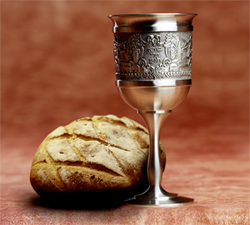Notes on the Notes – February 4, 2024

Fifth Sunday after Epiphany
This week’s music:
“We cannot measure How You Heal” (VU #613)
“We cannot measure how you heal
or answer every sufferer’s prayer,
Yet we believe your grace responds
where faith and doubt unite to care.
The pain that will not go away,
the guilt that clings from things long past,
The fear of what the future holds
are present as if meant to last.
So some have come who need your help,
and some have come to make amends;
Your hands which shaped and saved the world
are present in the touch of friends.
Lord, let you Spirit meet us here
to mend the body, mind and soul,
To disentangle peace from pain
and make your broken people whole.”
The words for our opening hymn were written by John Bell and Graham Maule for use at healing services. The tune, ANGELUS, is attributed to Georg Joseph (1657).
“And When You Call for Me” (MV #96)
“And when you call for me, I have already answered.
And when you call for me, I am already there.”
This sung introduction to prayer was written by Lynn Bauman in 2000, with music by Linnea Good (2004).
“Behold, Behold, I Make All Things” (MV #115)
“Behold, behold,
I make all things new, beginning with you
and starting from today.
Behold, behold,
I make all things new, my promise is true,
For I am Christ the way.”
Our response to the words of assurance was written by John L. Bell in 1995.
Hear the song sung by WPUC’s worship choir (2024):
“The Power of Your Love”
This week’s anthem was written by Geoff Bullock, a member of Australia’s Hillsong Church team. In 2006 Angelica Del Vasto of Worship Leader Magazine wrote about Bullock’s song “The Power of Your Love” that it “encompasses the listener with… the empowering conviction that the Creator of the universe has done, and is doing, everything to convey His love to us. It compels us to face our own weaknesses and then fall into the arms of God.” … Bullock acknowledged its (the song’s) influence on his later life, saying “so many of the songs that I had written [earlier] were given new meaning as I had to live out their inspiration. It is far easier writing a song than having to live out its words.”
“Lord I come to You
Let my heart be changed, renewed
Flowing from the grace
That i have found in You
And Lord I have come to know
The weaknesses I see in me
Will be stripped away
By the power of Your love
Hold me close
Let Your love surround me
Bring me near
Draw me to Your side
And as I wait
I will rise up like the eagle
And I will soar with You
Your Spirit leads me on
In the power of Your love
Lord unveil my eyes
Let me see You face to face
The knowledge of Your love
As You live in me
And Lord renew my mind
As Your will unfolds in my life
In living every day
By the power of Your love…”
“I Praise You, O God” (MV #61)
“I praise you, O God, with all of my heart.
With all the earth I will sing your praises.”
Our offering response for the season of Epiphany has words and music by David Robertson (2005) and was inspired by Psalm 138:1.
Hear this response at: https://www.youtube.com/watch?v=mLIH4X43Dxc
“As We Gather at Your Table” (VU #457)
“As we gather at your table, as we listen to your word,
Help us know, O God, your presence; let our hearts and minds be stirred.
Nourish us with sacred story till we claim it as our own;
Teach us through this holy banquet how to make Love’s victory known.
Turn our worship into witness in the sacrament of life;
Send us forth to love and serve you, bringing peace where there is strife.
Give us, Christ, your great compassion to forgive as you forgave;
May we still behold your image in the the world you died to save.
Gracious Spirit, help us summon other guests to share that feast
Where triumphant Love will welcome those who had been last and least.
There no more will envy blind us nor will pride our peace destroy,
As we join with saints and angels to repeat the sounding joy.”
The text for this communion hymn is from Carl P. Daw’s first collection, A Year of Grace: Hymns for the Church Year (1990). The familiar melody, BEACH SPRING, is attributed to Benjamin Franklin White (1844), with harmony by Ronald A. Nelson (1978).
“Sent Forth by God’s Blessing” (VU #481)
“Sent forth by God’s blessing, our true faith confessing,
The people of God from this dwelling take leave.
The supper is ended, O now be extended
The fruits of this service in all who believe.
The seed of Christ’s teaching, receptive souls reaching,
Shall blossom in action for God and for all.
God’s grace did invite us, God’s love shall unite us
To work for the kingdom and answer its call.
With praise and thanksgiving to God ever-living,
The tasks of our everyday life we will face.
Our faith ever sharing, in love ever caring,
Embracing God’s children of each tribe and race.
With your feast you feed us, with your light now lead us;
United us as one in this life that we share.
Then may all the living with praise and thanksgiving
Give honour to Christ and the name that we bear.”
The words for this post-communion hymn were written by Omer Westendorf, an organist, composer and music publisher in Cincinnati, Ohio. This arrangement of “Llynn Onn,” a traditional Welsh folk tune, is by Leland Sateren, an American Lutheran organist and composer. We know the tune as THE ASH GROVE.
Hear the hymn at: https://www.youtube.com/watch?v=HTnBNtH2gMk
“Go Now in Peace, Guided by the Light” (MV #211)
This commissioning and prayer for guidance was originally written in Spanish (“Vayan en paz”) by Pedro Rubalcava in 2002. It was arranged by Peter Kolar, also in 2002.
“Go now in peace, guided by the light of Christ,
So you may be nourished by the Word of Life.”


You must be logged in to post a comment.